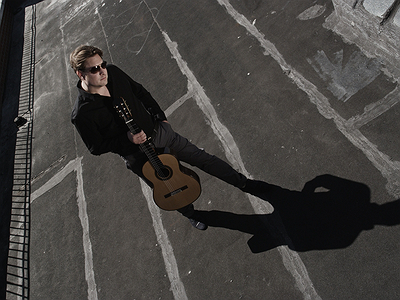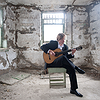Part 2
How do you make use of technology? In terms of the feedback mechanism between technology and creativity, what do humans excel at, what do machines excel at?
I’m very happy to employ others to help me with the technology side of things … I am of course fascinated by guys like Pat Metheny, Mason Bates, etc., but I cannot claim to be very hip on the technology end of things. I am fortunate to sometimes be able to call on other people to help me with those things.
Collaborations can take on many forms. What role do they play in your approach and what are your preferred ways of engaging with other creatives through playing together or just talking about ideas?
Collaborations for me, are as much about having fun on stage, and the whole process of traveling and touring (social) as much as the musical or artistic endgame of the project. Lincoln Center (CMSLC) concerts really were the fullest extension of that whole thing! Chamber music has always been a part of my life, and I am very blessed to be able to have collaborated with many top-level musicians on-stage and on recordings.
How is preparing music, playing it live and recording it for an album connected? What do you achieve and draw from each experience personally? How do you see the relationship between improvisation and composition in this regard?
Once you have “planned your moves,” with preparing a piece for performance, you have to practice/prepare in such a way to be able to do those “moves” live. Once you have played things live, you have to transmit the live experience in a commercial recording situation. And a lot of times, in my experience, I have had to skip the second step and record as if I had played the piece live. Every recording experience over the last 25 years or so has been a different experience for me; it would take a very long time obviously to explain them all in detail.
In terms of improvisation on stage, that has to happen according to the musical situation at the time. I have outlets for improvisation with certain collaborators like Julien Labro, or arrangements. Or I will write something.
How do you see the relationship between the ‘sound’ aspects of music and the ‘composition’ and ‘performance’ aspects? How do you work with sound and timbre?
I never really “work” on sound or timbre at all now. My work at CIM with John Holmquist laid that foundation almost 30 years ago.
The timbre becomes evident during the interpretation of the musical directions of the composer, as a musical detail, like articulation or dynamic, in order to imbue a certain character that the music is more or less “asking” me to do.
In a performance situation for the public, you have to discern what is right for that particular performance situation. And if it involves amplification, just as one example, then I am all for it. I actually want the audience to hear what I am trying to do, in a concerto situation, for example. If I am playing solo recital in most halls of 1000 seats or less, my natural performance sound will carry it. When it’s more than 1000 seats, I want what is going to get the best possible end result for the greater good.
Our sense of hearing shares intriguing connections to other senses. From your experience, what are some of the most inspiring overlaps between different senses - and what do they tell us about the way our senses work? What happens to sound at its outermost borders?
I personally don’t have a very strong sense of visual, when it comes to music. The kinesthetic aspects of the fingers are basically worker ants that carry out what is going on in my ear. I realized when I was pretty young, teaching other classical guitarists, that this is not the case with everybody. Everybody is unique and different, has different strengths and weaknesses – that is why we need good teachers to guide us.
Art can be a purpose in its own right, but it can also directly feed back into everyday life, take on a social and political role and lead to more engagement. Can you describe your approach to art and being an artist?
I really don’t think about things like this at all … I guess the way to answer this question is, maybe I am a “music for music’s sake” kind of guy. I just let the chips fall where they may. I don’t relate music that much to my own personal daily life. Whatever I might convey to other people with music is not necessarily a representation of my life, at least not consciously.
I relate to the inner workings of being a practicing musician to things like professional football, or golf, or baseball ... particularly pitchers, quarterbacks, golfers. Or Scientists. I almost feel like I relate to those folks more than I do most professional musicians. If I can’t engage the listener through the actual musical content of what I am playing in the moment, then oh well. I already feel the music pretty deeply, so the details are the science of it for me.
Obviously, if I have a student who connects their music study/profession more acutely to their everyday experience, I will advise them on those matters to help them achieve their goals.
To use a popular music analogy to this question, musicians and artists are either a Bowie, a Lennon, a Dylan, or a Fripp, or somewhere in between (more or less ... more recent times I suppose might be comparisons between 2010 Lady Gaga, early Fall Out Boy, most Springsteen, and any Tool).
It is remarkable, in a way, that we have arrived in the 21st century with the basic concept of music and performance still intact. Do you have a vision of music and performance, an idea of what they could be beyond their current form?
Yeah, I remember when everybody was getting scared about YouTube/Internet, that it was going to create empty concert halls … but, as we all learned from that, humans are humans, and in the end, we need to share experiences together. There is just something about the molecules in the room during an actual live performance, that cannot be transmitted through a 60 inch television screen, even with a state of the art audio system providing the musical details.






